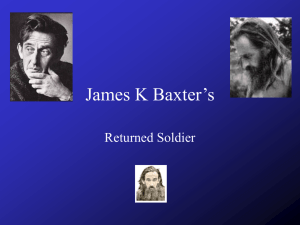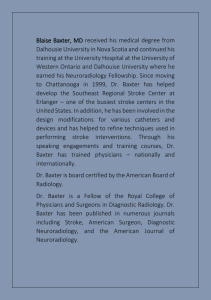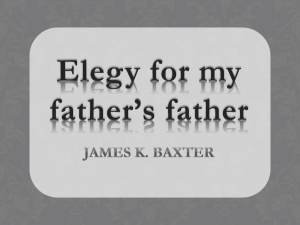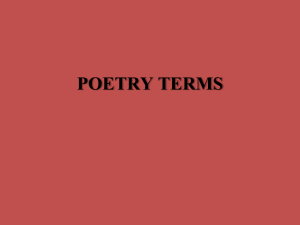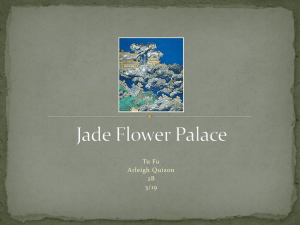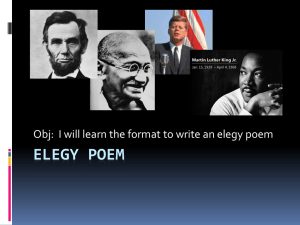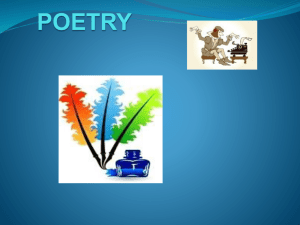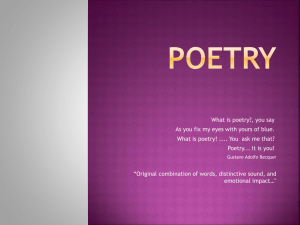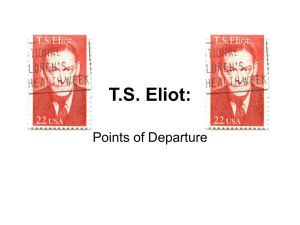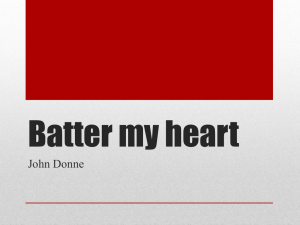Elegy for my Father`s Father
advertisement
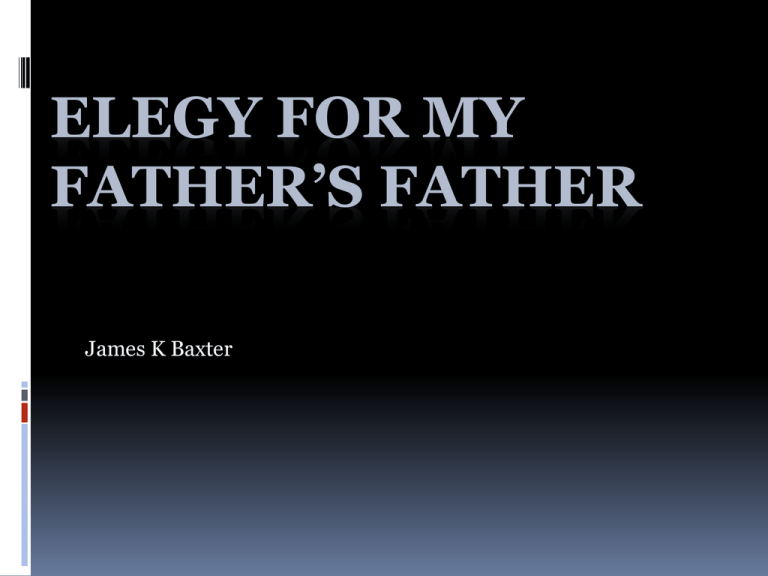
ELEGY FOR MY FATHER’S FATHER James K Baxter Baxter, James K. 1926–1972 A New Zealand poet, playwright, and critic, Baxter is generally ranked among the finest authors that country has produced. His work is strongly regional, drawing inspiration from the New Zealand wilderness, its tribal history, and natural cycles. Baxter's rejection of conventional social standards is evidenced by the unorthodoxy of much of his verse. A devout Christian, he has shaped his poetic philosophy to include elements of both religious and classical mythology, creating a viewpoint that is as highly moral as it is individualistic. To Baxter, a poem must be "a cell of good living in a corrupt society." Stylistically, his work is lyrical and metaphorical, and often shows the influence of Lawrence Durrell and Robert Lowell. Biography and Background Born in 1926, James K Baxter became one of New Zealand’s finest poets and most controversial figures. His judgments of society were often harsh, and were not always well received, but he was deeply concerned with the poor and those marginalised by society. Was born at Dunedin, New Zealand. His father was a pacifist farmer of Scottish descent and his mother took degrees in languages at Sydney and Cambridge. Baxter began to write verse at 7 and his elegydominated first volume, Beyond the Palisade, was published in 1944 when he was 18, manifesting the influence of Yeats and Dylan Thomas; the following year Allen Curnow singled him out for praise in the introduction to his A Book of New Zealand Verse 1923 –45 . He entered the University of Otago in 1944 but soon gave up, largely (by his own admission) because of excessive drinking. From an early age he claimed various mystical experiences which turned Christian in his late teens. He became a fervent Roman Catholic at the age of 32, but this did not lessen the pace of his hard-lived life; his major conflict was with the Calvinism in which he said he had been brought up, claiming that ‘New Zealand society (and, indeed, modern Western society in general) carries like strychnine in its bones a strong unconscious residue of the doctrines and ethics of Calvinism’. He remained a selfstyled figure of the ‘wilderness’ who always saw the artist as a tribesman cut off from his tribe, even when he returned to Otago University as Burns Fellow. Latterly he lived in the small Maori settlement of Jerusalem; he died at the age of 46 while on a visit to Auckland. Despite his breaches of taste, his repetitiveness, and his excessive output, Baxter is a major figure in twentieth-century English poetry: in New Zealand only Allen Curnow can rival his achievement. Curnow's urbanity and self-consciousness contrast markedly with the more inspirational wildness of Baxter; Baxter attacked Curnow fiercely for being stuck in the politically anxious Thirties, when writers agonized over the imperialist ill-treatment of the Maoris, ignoring the new poets who ‘in the late Forties and Fifties … seceded from the self-conscious New Zealandism … and began to write simply as people who happened to live in a given time and place’. It is an ironic charge for Baxter to level, since his poetry, though founded in personal observation and experience of nature, is always socially aware (he was lastingly affected by the poverty of Japan and India, which he visited on a UNESCO grant in 1958 ), and his later poetry is suffused with Maori words and themes. Paradoxically, too, his attacks on Calvinism cover a Calvinist contempt for modern culture's shoddy acquisitiveness. His poetry is hectoring, vatic, and often sexist; but it is never dull, because nearly every line has urgency and verbal life. He was a fine critic, and he wrote good pieces on ‘Tam O'Shanter’ and on Wilde. Elegy for My Father’s Father He knew in the hour he died That his heart had never spoken In eighty years of days. O for the tall tower broken Memorial is denied: And the unchanging cairn That pipes could set ablaze An aaronsrod and blossom. They stood by the graveside From his bitter veins born And mourned him in their fashion. A chain of sods in a day He could slice and build High as the head of a man And a flowering cherry tree On his walking shoulder held Under the lion sun. When he was old and blind He sat in a curved chair All day by the kitchen fire. Many hours he had seen The stars in their drunken dancing Through the burning-glass of his mind And sober knew the green Boughs of heaven folding The winter world in their hand. The pride of his heart was dumb. He knew in the hour he died That his heart had never spoken In song or bridal bed. And the naked thought fell back To a house by the waterside And the leaves the wind had shaken Then for a child’s sake: To the waves all night awake With the dark mouths of the dead. The tongues of water spoke And his heart was unafraid. The SIFT method to analyse and revise poems. Specify the subject matter and sense of the poem through a brief summary Inform us of the intention of the poet and his/her main ideas overall Focus on the form ( structure/punctuation) and the feelings conveyed ( poet’s attitude/tone used) and how this highlights the main ideas Tell us about the techniques, imagery and poetic language that show the ways ideas are presented Childhood /Youth Poetry Do now: Read Allen Curnow’s ‘Country School’ – 1st for the gist, 2nd for better understanding, 3rd for meanings – annotate features of the poem (language/ sound/ structure/ scansion) Next: look back at Elegy – complete TEAR chart. Note down comments for deeper analysis. Then: In groups – divide yourselves up so that half analyse ‘My Parents’ using SIFT and half analyse ‘Country School’ also using SIFT. EXIT PASS: each group feed back to class a point about each poem. Close Reading Questions Diction T E A “cairn” (heap of stones set up as a landmark, monument, tombstone) ii) “aarons rod” look this up. (identify (provide (analyse What is the effect of the title technique) example) the “father’s father”, instead of “grandfather”? meaning) What is the effect of the soft consonants in the 1st line? Elegy means a lament – identify where the poem’s tone changes from celebration, to sorrow, and to regret . Identify at least 10 different language techniques – there is personification, metaphor, repetition and many others. Draw up a chart with the headings: “T” for Technique, “E” for Example, “A” for analyse, and “R” for relevance. R (explain how it is relevant to the poem) Deeper Reading This single stanza poem presents a developing set of responses to the death of the narrator’s grandfather, though the term ‘Father’s Father’ in the title makes the line of progression through family lines more explicit than the noun ‘grandfather’. Though the term ‘Elegy’ means lament, the tone of the poem is mixed, with celebration, sorrow and regret. One of the key regrets is for a life lived without expression of feelings; twice the poem refers to the fact that ‘his heart had never spoken’. The reader gains the impression of a somewhat grim and taciturn man. Even his family seem to find it difficult to mourn his passing: ‘They stood by the graveside/ ... / And mouned him in their fashion.’ Deeper Reading continued However, the poem also pays tribute to his strength and endurance. These images are directly followed by the description of him ‘old and blind’, sitting ‘All day’. The suddenness of the contrast emphasises the gulf between his prime and his old age. The poem also suggest, that despite his failure to express feelings, he was sensitive to his experiences of the natural world around him. The narrator finally conjectures that his grandfather’s keen awareness of the cycle of life enabled him to be ‘unafraid’ of death.
